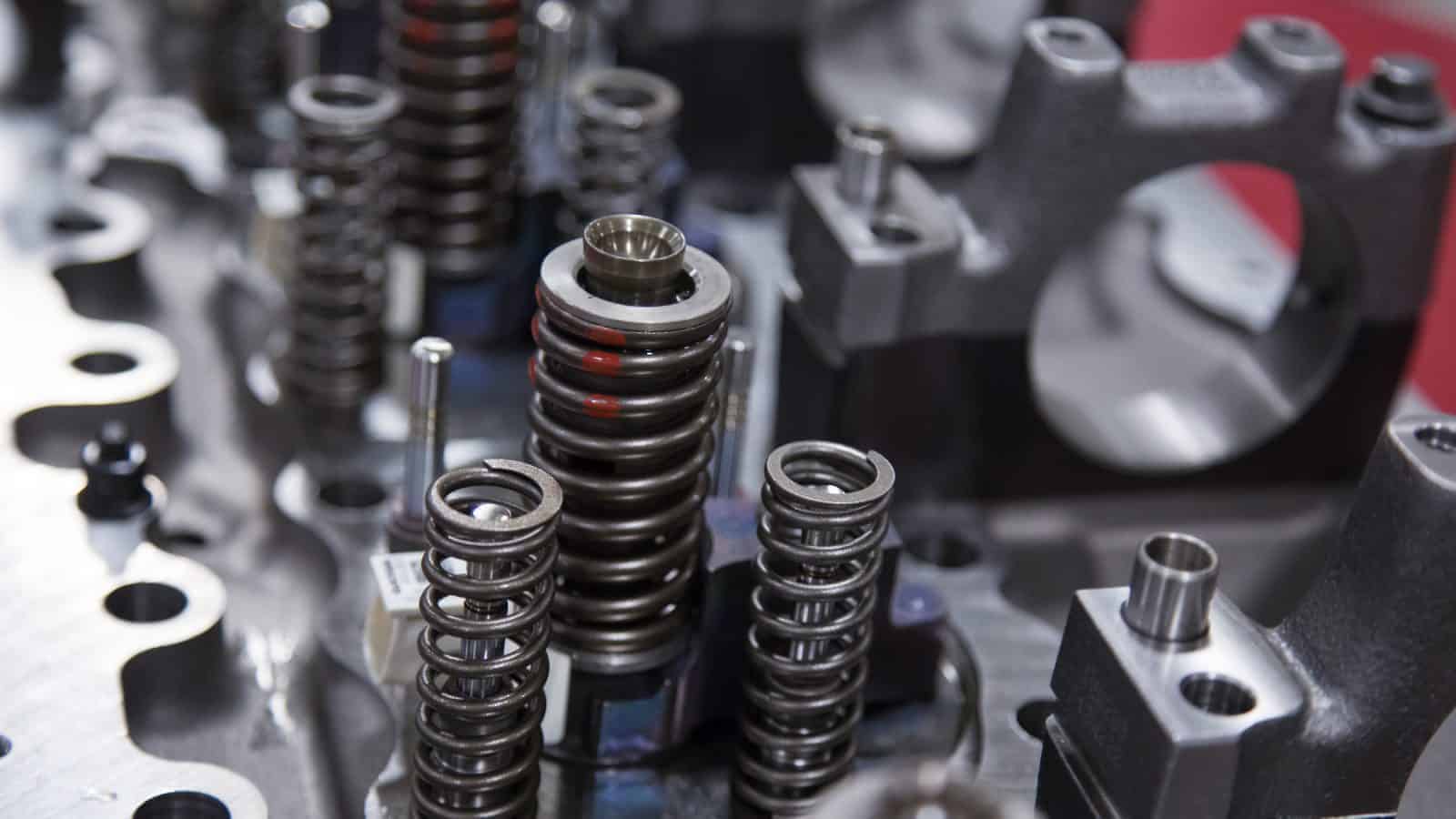Global COVID-19 Toll Reaches 1 Million

As concerns grow about another wave of COVID-19 infections this fall and winter, the world has passed a grim milestone: 1 million deaths from COVID-19, The Wall Street Journal (subscription) reports. Here’s the latest on the resurgence of COVID-19 both in the United States and abroad.
- Europe prepares for another wave, sans lockdowns: Cities across Europe are fighting a surge in COVID-19 infections by strengthening social distancing rules—but they aren’t returning to full lockdowns, like those that were put in place this spring, The Wall Street Journal (subscription) reports.
- The numbers for the U.S.: More than 20 U.S. states report COVID-19 spikes over the past week. Meanwhile, an analysis of Johns Hopkins University data found that only 11 states saw cases decline more than 10% in that same time period, The Hill explains. The remaining states reported level infection rates.
- Trouble in the Midwest: Positive COVID-19 test rates have risen above 25% in some Midwest states, an analysis by Reuters found. North Dakota’s positive test rate is averaging 30%, while South Dakota’s has reached 26%. “The World Health Organization considers rates above 5% concerning because it suggests there are more cases in the community that have not yet been uncovered,” Reuters explains.
NAM in action: As the nation prepares for a potential uptick in COVID-19 cases, it becomes even more important to encourage greater adherence to safety practices that limit community spread. A few weeks ago, the NAM launched the “Creators Respond Commitment” to help manufacturing companies encourage wider outside-of-work compliance with safety practices. You can access the email templates to share this campaign with your team members at this link.
Racial Inequality Cost U.S. Economy $16 Trillion Over 20 Years

The effects of racial inequality can be difficult to quantify. But a new report from Citigroup tries to calculate some of the damage, putting a dollar amount on the economic impact of racial discrimination over the past 20 years, CNBC reports.
This analysis found that racial inequality and discrimination reduced U.S. GDP by more than $16 trillion over that time period. That total includes money that Black Americans lost due to inequalities in salary, housing, access to higher education and lending to business owners.
Here’s what manufacturers are doing to address racial inequality in the industry:
- Pledge for Action: In June, the NAM’s Executive Committee unanimously passed an 11-point commitment plan for manufacturers to advance justice, equality and opportunity for Black people and all people of color.
- Closing the opportunity gap: Last week, during the NAM board meeting, manufacturers committed to taking 50,000 tangible actions to increase equity and pay in the industry, as well as creating 300,000 pathways to job opportunities for Black people and all people of color. As a result, manufacturing will reflect the diversity of the overall U.S. workforce by 2030.
Manufacturers Put Forward Bold Actions to Close Opportunity Gap and Transform Industry Workforce
Task Force of Industry Leaders Identify and Offer Next Steps
Washington, D.C. – Following the industry’s June “Pledge for Action,” the National Association of Manufacturers brought industry leaders together to focus on recommending bold next steps manufacturers can take to increase equity and parity for underrepresented communities in America.
The Task Force on Closing the Opportunity Gap has put forth actions that will transform the industry workforce: By 2025, manufacturers commit to taking 50,000 tangible actions to increase equity and parity for underrepresented communities, creating 300,000 pathways to job opportunities for Black people and all people of color. In doing so, manufacturing will reflect the diversity of the overall U.S. workforce by 2030.
The Manufacturing Institute, the NAM’s workforce development and education partner, will collect individual commitments from companies to ensure that the goal of 50,000 actions is met by 2025 and that the industry reaches its diversity goals by 2030. NAM President and CEO Jay Timmons affirmed the commitment on behalf of the industry.
Timmons, Trane Technologies Chairman and CEO and NAM Board Chair Mike Lamach and Manufacturing Institute Executive Director Carolyn Lee made the following statements on this landmark initiative.
“Our industry plays an integral role in lifting up people and communities,” said Lamach, “and now we have a special obligation to stand with and support all people who face injustice. We must play a part in tearing down the persistent and pernicious structural barriers to opportunity in this country.”
“I am proud to make this commitment on behalf of the industry and thank Mike and the task force for their leadership. As manufacturers across America redouble our efforts to build more inclusive and equitable workplaces and communities, we will be the catalyst for even greater change,” said Timmons. “We can spark a chain reaction for equity—that makes our businesses more successful, our communities stronger and our nation one that truly guarantees ‘liberty and justice for all.’”
“Not only are manufacturers making a bold promise, but they are also committing to be held accountable,” said Lee. “The Manufacturing Institute will collect individual commitments from companies, support their efforts with key resources and track the industry’s progress in creating these opportunities and pathways over the coming years to ensure we reach our 2030 target.”
Background on the Task Force: On June 11, the NAM’s Executive Committee unanimously approved the 11-point “Pledge for Action” to advance justice, equality and opportunity for Black people and all people of color. The Task Force on Closing the Opportunity Gap’s commitment, announced today, follows through on elements of the “Pledge for Action.”
Members of the task force include the following:
- Task Force Chair: Mike Lamach, chairman and CEO, Trane Technologies and NAM Board chair
- Dev Ahuja, SVP and CFO, Novelis Inc.
- Alejandro Alvarez, SVP, chief production officer and sustainability officer, Brown-Forman Corporation
- Neil Chapman, senior vice president, Exxon Mobil Corporation
- Julie Copeland, CEO, Arbill
- Mark Cordova, president, Centennial Bolt, Inc.
- Chris Edwards, Co-CEO, Edward Marc Brands, Inc.
- Jim Fitterling, chairman and CEO, Dow Inc. and NAM Board vice chair
- Vicki Holt, president and CEO, Protolabs and NAM Small and Medium Manufacturers Group vice chair
- Frederick Humphries, corporate VP, U.S. government affairs, Microsoft Corporation
- Vimal Kapur, president and CEO, Honeywell Building Technologies
- Lawrence Kurzius, chairman, president and CEO, McCormick & Company, Inc.
- Mike McDermott, president, Pfizer global supply, Pfizer, Inc.
- Aneesa Muthana, president and CEO, Pioneer Service Inc.
- Chris Nielsen, EVP – product support and chief quality officer, Toyota Motor North America
- Quentin Roach, SVP – global supply chain and chief procurement officer, Mondelez International
- Kathy Wengel, EVP, chief global supply chain officer, Johnson & Johnson
- Chris Womack, president, external affairs, Southern Company
-NAM-
The National Association of Manufacturers is the largest manufacturing association in the United States, representing small and large manufacturers in every industrial sector and in all 50 states. Manufacturing employs more than 12.1 million men and women, contributes $2.36 trillion to the U.S. economy annually and has the largest economic multiplier of any major sector and accounts for 63% of private-sector research and development. The NAM is the powerful voice of the manufacturing community and the leading advocate for a policy agenda that helps manufacturers compete in the global economy and create jobs across the United States. For more information about the NAM or to follow us on Twitter and Facebook, please visit www.nam.org
How a Manufacturer Brought 3D Printing into the Foundry
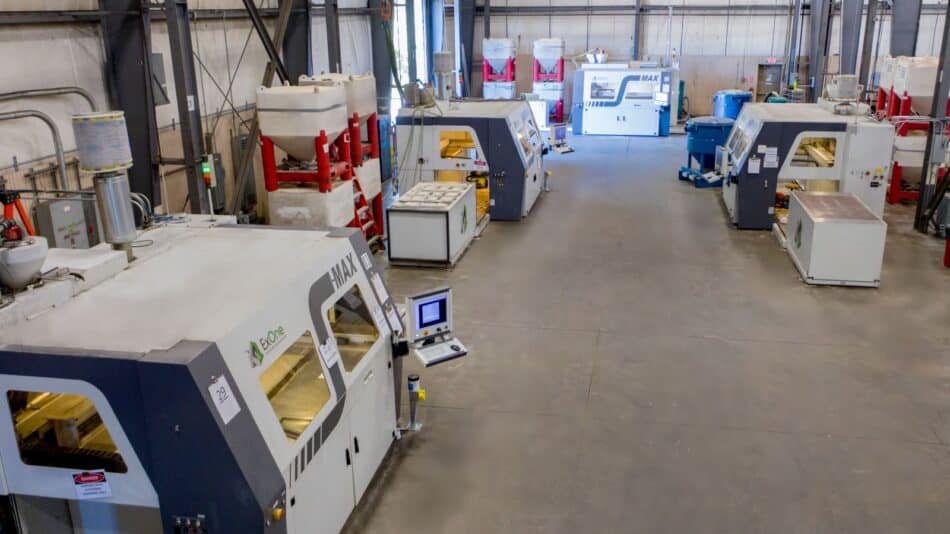
When you think of 3D-printing, you probably don’t think of metal casting. But in fact, 3D-printing has been a huge help to foundries—thanks in large part to one Ohio-based company, Humtown Products. In 2014, the family-owned business decided to try using 3D printers to create castings for engine blocks in cars, trucks, construction equipment and aerospace technology. Since then, Humtown has led an industry-wide transformation of metal casting and will be recognized at the 2020 Manufacturing Leadership Awards in October for commercializing 3D printing in the sector.
How it works: Ordinarily, metal casting involves creating a tool or pattern from materials like plastic or wood, then packing sand tightly around the pattern to form a mold. Then workers pour metal into the mold, creating the finished component. But with 3D printing technology, Humtown can skip the tooling stage entirely, printing the sand mold through software commands instead.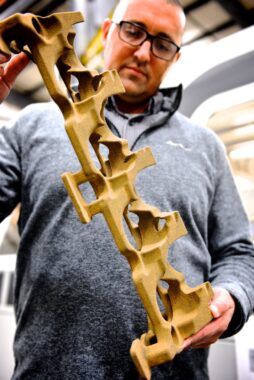
How they did it: Back in 2014, there were only a few sand-casting 3D printers in north America. They were mostly used for prototyping and cost two million dollars each. Because the technology hadn’t been widely used, Humtown struggled to find a bank that would finance a loan. The company ended up working with America Makes—a program launched by President Obama—and partnering with local schools like Youngstown State University and the University of Northern Iowa, which was primarily using the technology for prototyping at the time.
Brandon Lamoncha, who is now Director of Additive Manufacturing at Humtown Products, spent three years traveling to and from Iowa to study the technology, while also traveling to foundries around the country to spread the word about 3D-printing. He made the case that a new wave of technology was coming—and that, if American foundries didn’t embrace it, they would be left behind the curve and possibly out of business.
“When we got into this game,” Lamoncha says, “you could count on one hand the number of 3D sand printers in North America. Now there’s 40 or 50.”
The benefits: The technology has been effective for a number of reasons.
- It’s faster: Using traditional methods, it might take 18-20 weeks to develop the tooling to make a cylinder head for a customer’s car. Now, Humtown can receive the data they need on a Friday, run their printers over the weekend and start pouring metals on Tuesday or Wednesday.
- It’s more efficient: A lot of machining involves subtractive technology; for example, you might take a hunk of aluminum, carve out what you need and discard what you don’t. With 3-D printing technology, Humtown is using additive manufacturing instead: they’re starting with nothing, and building only the things they need.
- It’s powerful: The technology allows the metal casting industry to make parts that were once too complicated to make using conventional processes. For example, complex volutes for pumps were made in sections in the past—but 3D printing allows the parts to be made all together.
- It’s creative: 3D printing allows Humtown to produce novel designs that weren’t possible to make with tooling. Now, the company can take full advantage of the creativity of their engineers.
The result: Six years ago, 3D printing was used in less than 2 percent of sales at Humtown. Today that number has risen to 40 or 50 percent.
The last word: “In hundreds of years, nothing has been this big of a paradigm shift,” said Lamoncha. “Humtown has been around since 1959. Casting has been around since the Egyptians, and not a lot has changed in the metal casting industry. This kind of change? This is amazing.”
NAM Health Care Helps Small Manufacturers

When Litko Aerosystems’ health-care provider increased its rates by double digits — again — CEO Ken Litko knew he needed another option. That’s when he signed his business up with NAM Health Care, an association health plan created by the NAM, Mercer and UnitedHealthcare®. The plan allows manufacturers with fewer than 100 employees to band together in order to purchase affordable coverage that is usually available only to larger manufacturing companies.
The good stuff: NAM Health Care gives small and medium-sized businesses a bunch of great reasons to join, including:
- Comprehensive benefits: NAM Health Care offers a range of benefits, including health insurance, vision coverage, dental benefits and life insurance policies.
- Lower costs: NAM Health Care plans may help manufacturers save on their annual health insurance costs and help employees save on premiums.
- Access to health tools: NAM Health Care provides access to UnitedHealthcare’s largest preferred-provider organization networks. It also offers access to Mercer’s Multiple Employer Solutions suite, which is a one-stop shop designed to make the benefits buying process easy for NAM members and their employees.
- A tailored experience: NAM Health Care is designed specifically for small to medium-sized manufacturers. Instead of forcing employers and workers to hunt around for the kind of coverage that works for them, NAM Health Care prioritizes manufacturers’ needs and interests.
How it works: NAM Health Care is operated by the plan’s Governing Committee, which is made up of mostly small and medium-sized manufacturers. The committee manages the NAM’s medical, dental, vision and life plans with the support of Mercer and UnitedHealthcare.
Why it matters: At a time when manufacturers are seeking millions more skilled workers, a strong health benefits program may help attract and retain talented people. According to a study by marketing agency Fractl, which was featured in the Harvard Business Review, 88% of respondents would give health coverage “some consideration” or “heavy consideration” when job hunting (the highest ranking in the study). With NAM Health Care, manufacturers can offer excellent benefits to current and prospective employees.
The last word: According to Litko, “We were looking for a reduction in overall cost, and we were looking for a reduction in employee costs. . . . Looking at what we have currently, I’m definitely glad we changed when we changed.”
Check out the plans here.
Manufacturers Take Advantage of Federal Liquidity Programs

The NAM released the results of its most recent Manufacturers’ Outlook Survey today. Manufacturers reported a boost in optimism—up from 33.9% in Q2, which was the lowest reading since the first quarter of 2009. The survey also found that a significant number of manufacturers used the federal liquidity programs that the NAM advanced early in this pandemic. The data shows:
- 72 percent of manufacturers that faced negative cash flow impacts due to COVID-19 used the Paycheck Protection Program, Main Street Lending Program or other liquidity program.
- Nearly 92 percent of manufacturers that used federal liquidity programs said those funds were helpful in keeping their business afloat, retaining workforce or meeting other necessary expenses.
- 66 percent of manufacturers are positive about their company’s outlook, a great improvement from the Q2 results. Still, the outlook remains below the historical average of 74.4%, and 62% of manufacturers expect their firm’s revenues will not get back to pre-COVID-19 levels until 2021 or later.
Additional context from NAM President and CEO Jay Timmons: “Congress and the administration have acted on more than five dozen of the policy provisions that the NAM made in our ‘American Renewal Action Plan’ and other recommendations. Without the bipartisan relief legislation signed into law earlier this year, this rise in optimism would not have been possible. But for our industry to truly recover and to keep our economy growing, further bipartisan congressional action is needed.”
You can find the full survey here.
Manufacturing Sees an Increase in Job Openings

The Bureau of Labor Statistics released its Job Openings and Labor Turnover Survey (JOLTS) for July, which shows the persistent gap between open manufacturing positions and available skilled workers—even amid a pandemic. According to the survey, the manufacturing industry saw 408,000 manufacturing job openings in July—an increase of more than 60,000 jobs since the prior month and the best result since February, before widespread COVID-19 restrictions came into effect.
A few more numbers:
- Nonfarm business job openings rose from 6,001,000 in June to 6,618,000 in July, which was also the strongest pace since February (7,004,000).
- Net hiring remained weak, with manufacturers taking on 321,000 workers in July, down sharply from 432,000 in June.
- Nonfarm business layoffs decreased from 1,995,000 in June to 1,721,000 in July, which represents the slowest pace since March 2019 (1,698,000). Meanwhile, layoffs in the manufacturing sector declined from 184,000 to 157,000.
What the numbers mean: According to NAM Chief Economist Chad Moutray, “This suggests that firms are once again increasing their interest in adding new workers, even as the sector attempts to rebound from the COVID-19 pandemic and the overall labor market has changed dramatically.”
Related: Applications for state unemployment benefits failed to decline as expected in July, Bloomberg reports.
Say “Ahhh”: A Manufacturer Makes It Safe for Dentists to Reopen
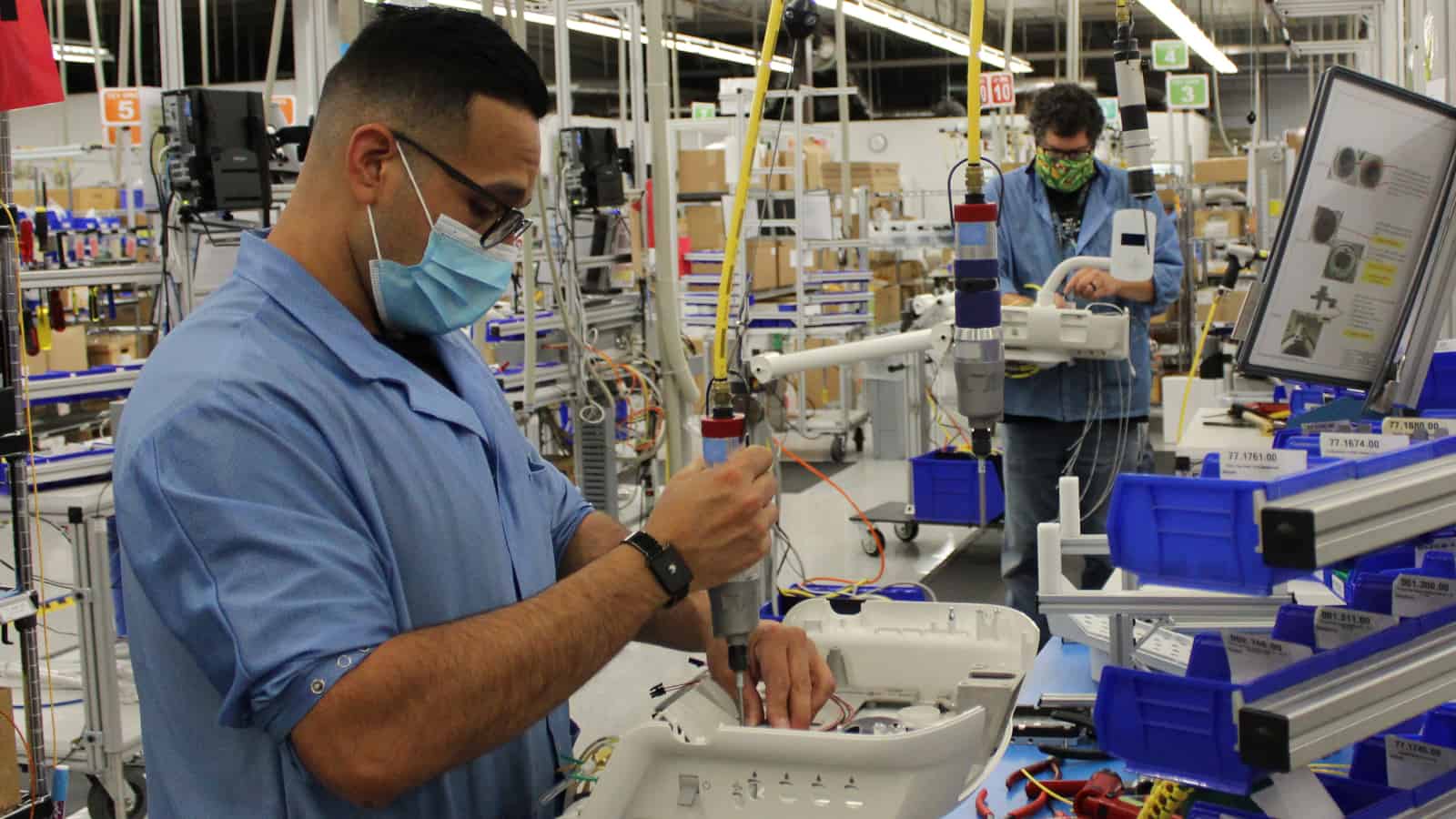
What do you do when a pandemic shuts down your customers? That was the problem faced by A-dec, a manufacturer of dental equipment and supplies based in Oregon, when dentists nationwide closed their doors back in March.
In A-dec’s case, they developed products to help their core customers come back safely.
The problem: Dentists and hygienists are at particular risk of contracting COVID-19 while treating patients, because their jobs require proximity to their patients’ open mouths.
- Dentists also use loupes with lights and magnifiers to see inside patients’ mouths—but wearing medical masks and traditional face shields makes it difficult to wear lighted loupes as well.
- Meanwhile, traditional face shields are open at the bottom—and because dentists work on patients who recline right below them, those shields provide limited protection.
The solution: A-dec’s engineers got to work designing and producing a unique face shield for dentists that fits around the collarbone and opens upwards, providing a barrier between dentists and patient. The shield also leaves additional space around dentists’ eyes so they can use lighted loupes.
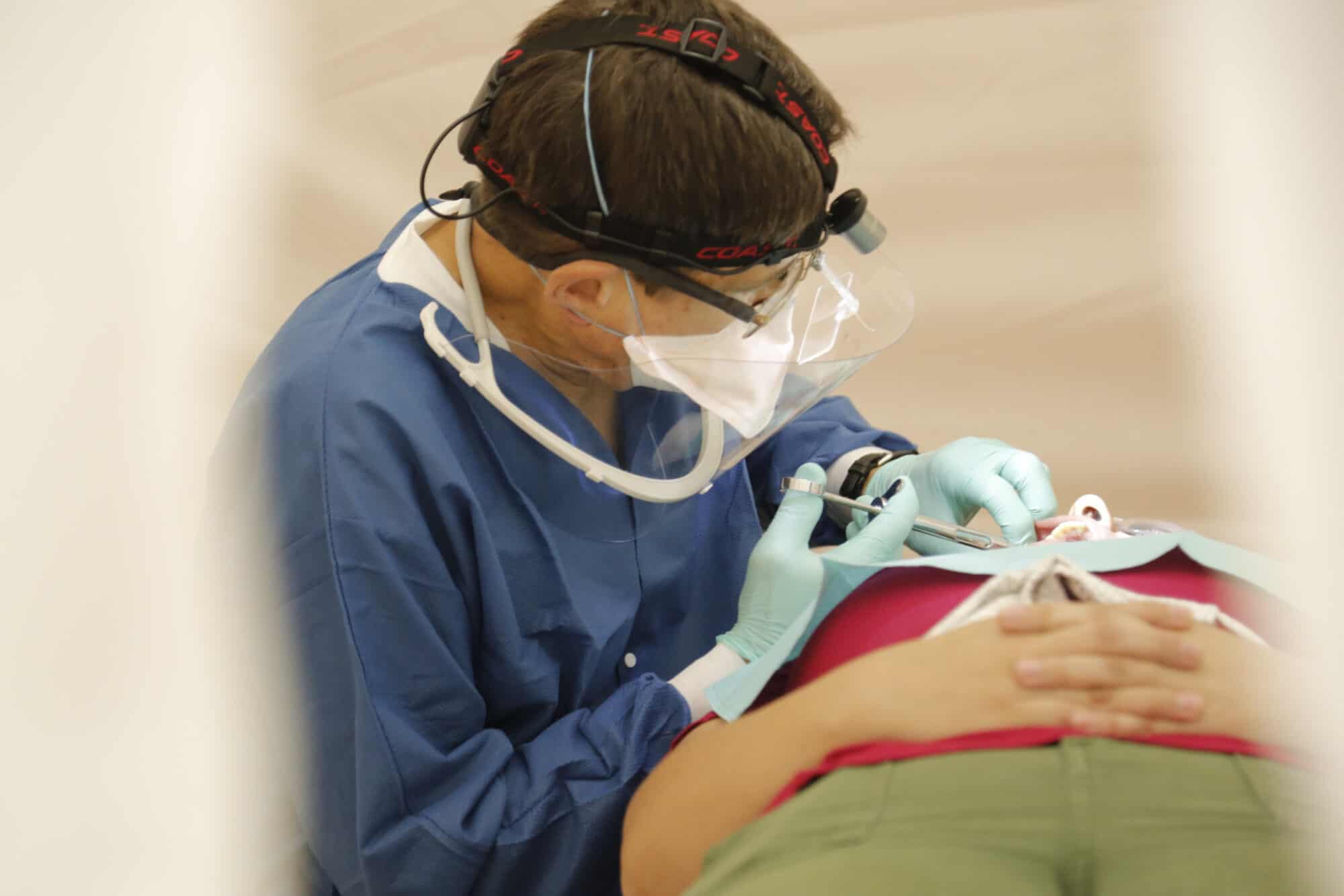
The process: The same pandemic that made this work necessary also made it difficult. A-dec had to overcome a series of complications:
- Research and development: COVID-19 made the company’s customer focus groups impossible to do in person, so it designed and conducted remote focus group sessions.
- Sourcing of materials. Shortages and supply chain disruptions also caused problems, with some commodities becoming unavailable at the last minute. That meant A-dec faced delays and had to find alternate sources of materials at times.
- Product construction. Like many other manufacturers, A-dec had to figure out how to keep remote workers and on-site, socially distancing workers in sync with each other—all while creating a new product in record time.
By working around these setbacks and streamlining its processes, A-dec was able to go from the initial idea to the beginning of production in just two months—an extraordinary achievement.
The last word: According to A-dec Vice President of Manufacturing Wesley Snyder, the company benefited from its familiarity with medical regulations—but that doesn’t mean non-medical manufacturers can’t make a difference. “Everything is made by somebody, and the manufacturing industry is uniquely positioned to make tangible contributions to society in a crisis like this,” he said. “So find those new points of need, and align them with your capabilities.”
A Moose That Keeps You Safe: A Visit to a Sign Manufacturer
A moose inside a factory would usually be a major hazard—except when it’s on a COVID-19 safety sign made by LEM Products, Inc. The custom sign and label manufacturer created a range of ingenious signs for their own facilities to keep their employees safe and healthy.
It was at LEM’s Montgomeryville, Pennsylvania, facility that NAM staff photographer David Bohrer snapped this moose in action, along with many other safety measures. Here’s some of what he saw.
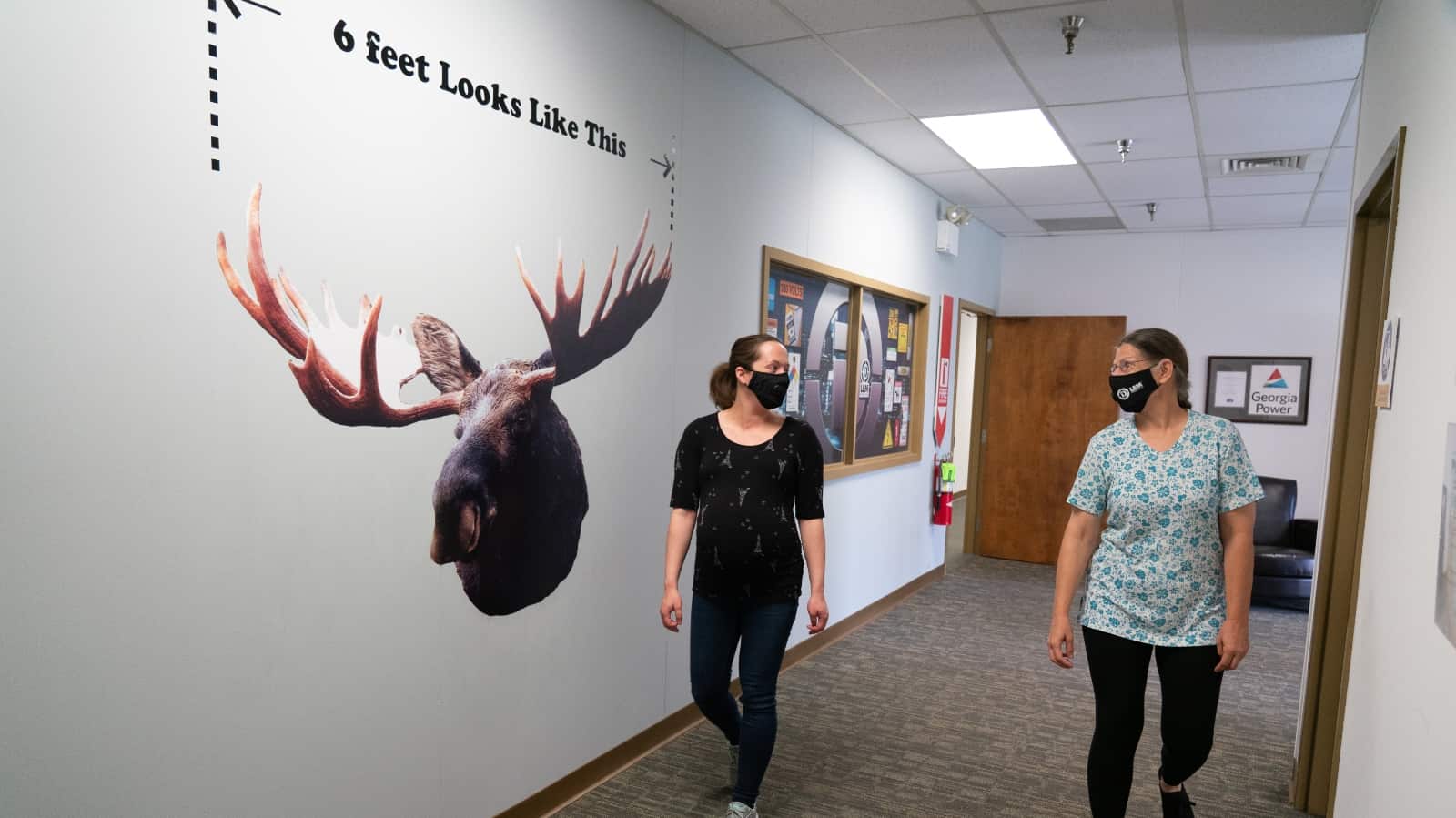
Throughout the facility, signs remind employees to maintain social distance, sanitize surfaces and wash their hands frequently. These decals show the appropriate distance: six feet of space.

And aside from the moose, there are more eye-catching reminders of what six feet looks like:
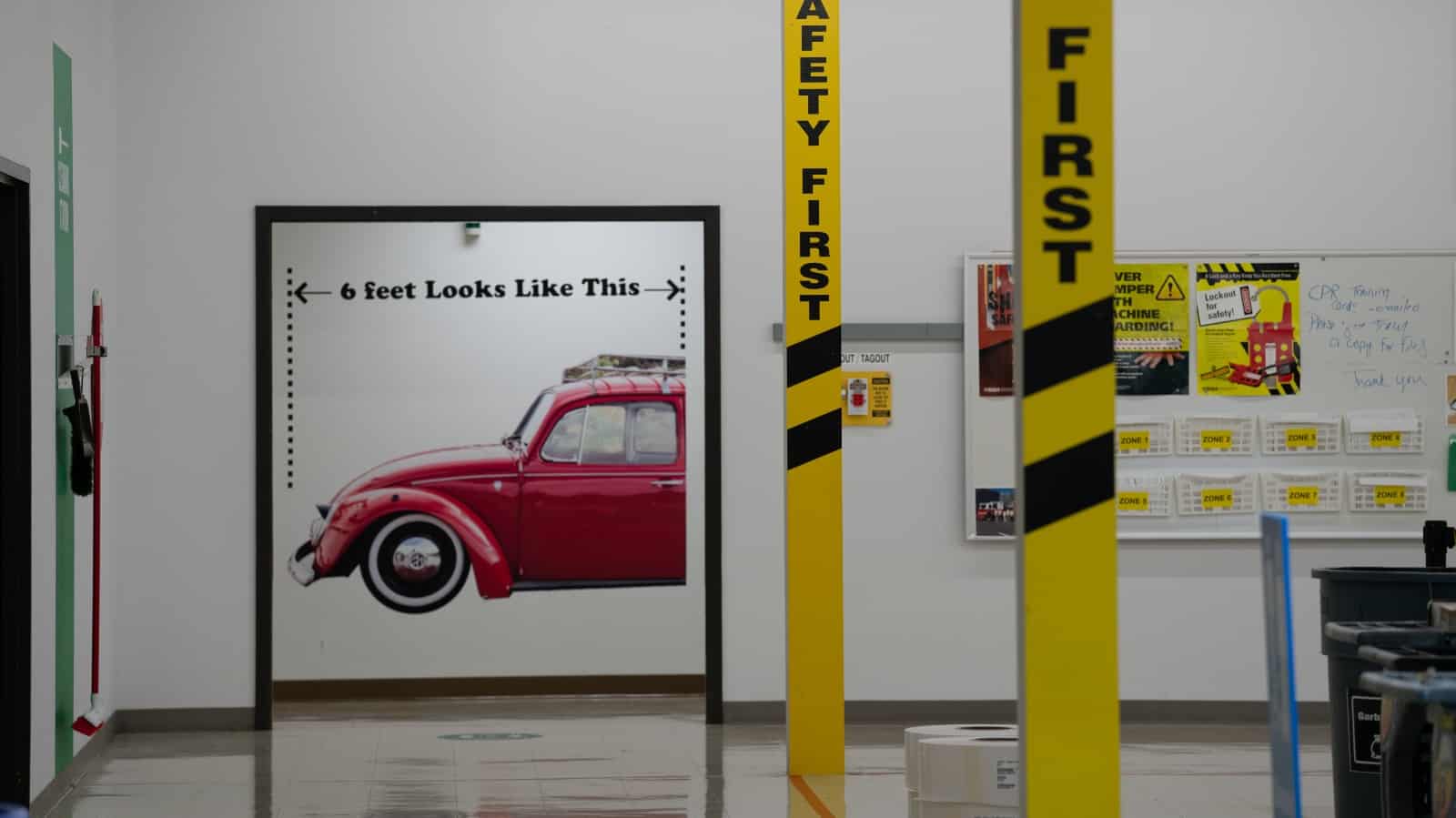
In work areas, signs at a six-foot distance ask: “Can you ask your question from here?”
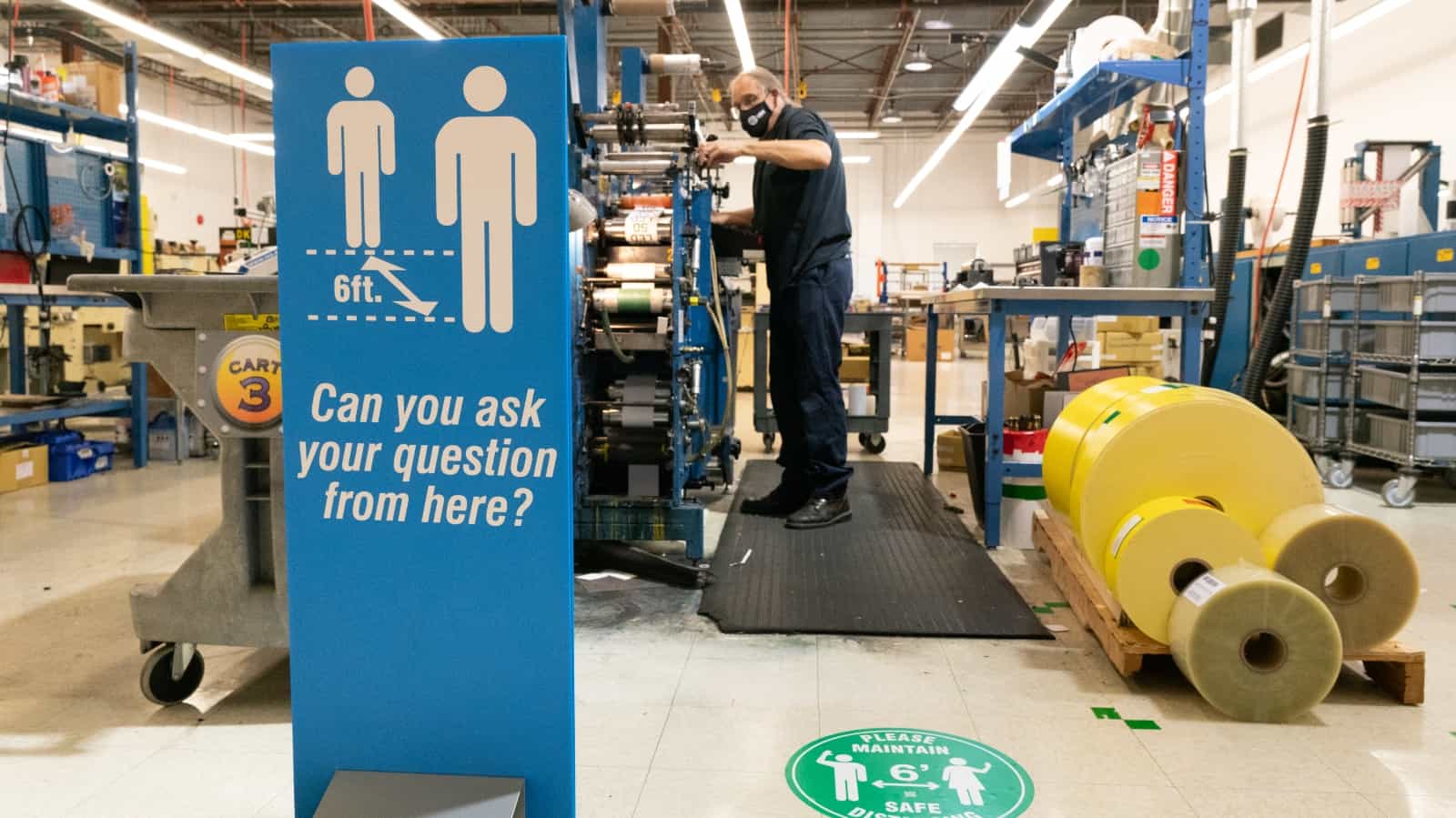
Employees also wear masks while moving around the facility.
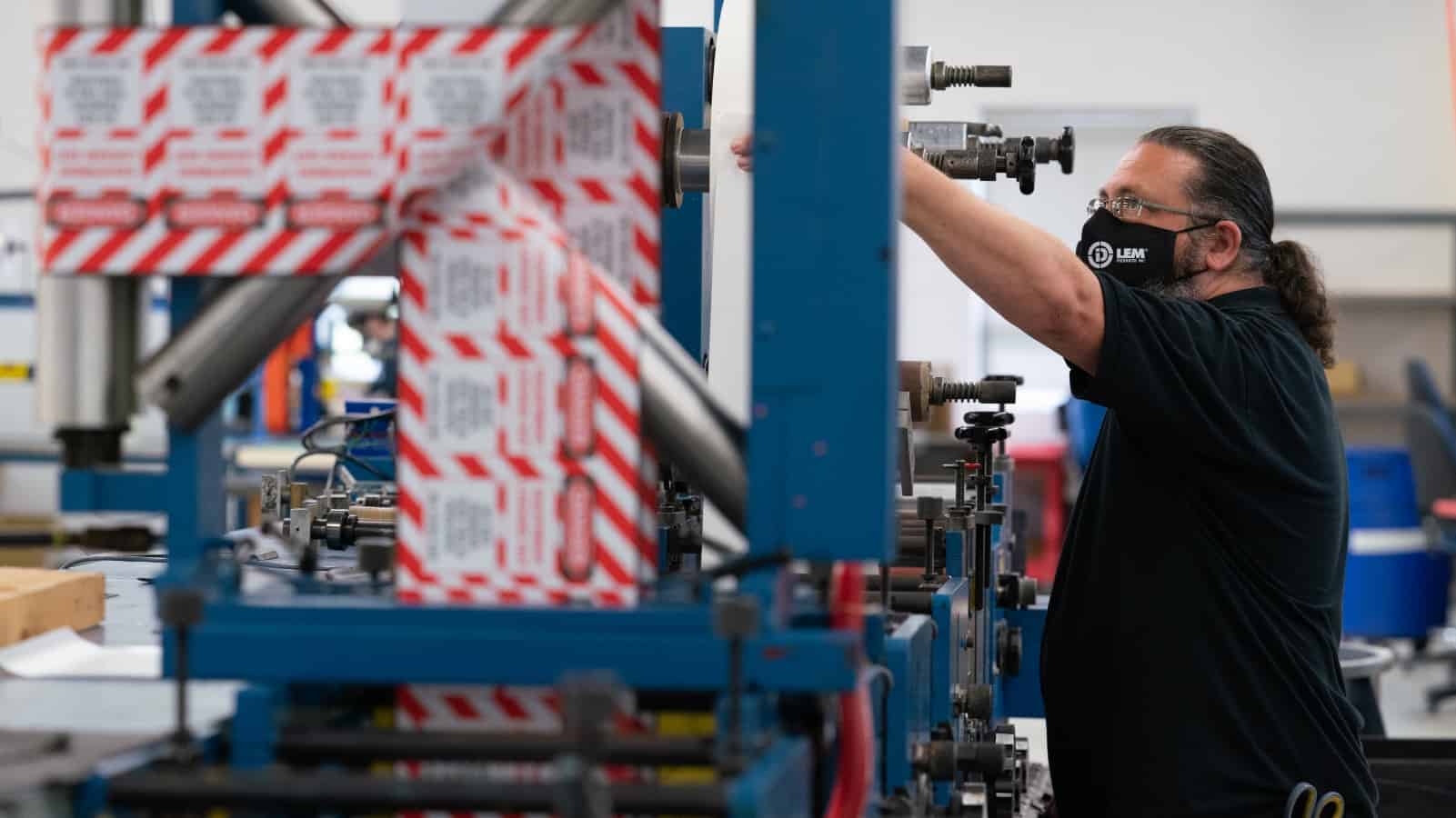
In the break room, dividers create distance between workers eating lunch. And another animal friend is here to help!
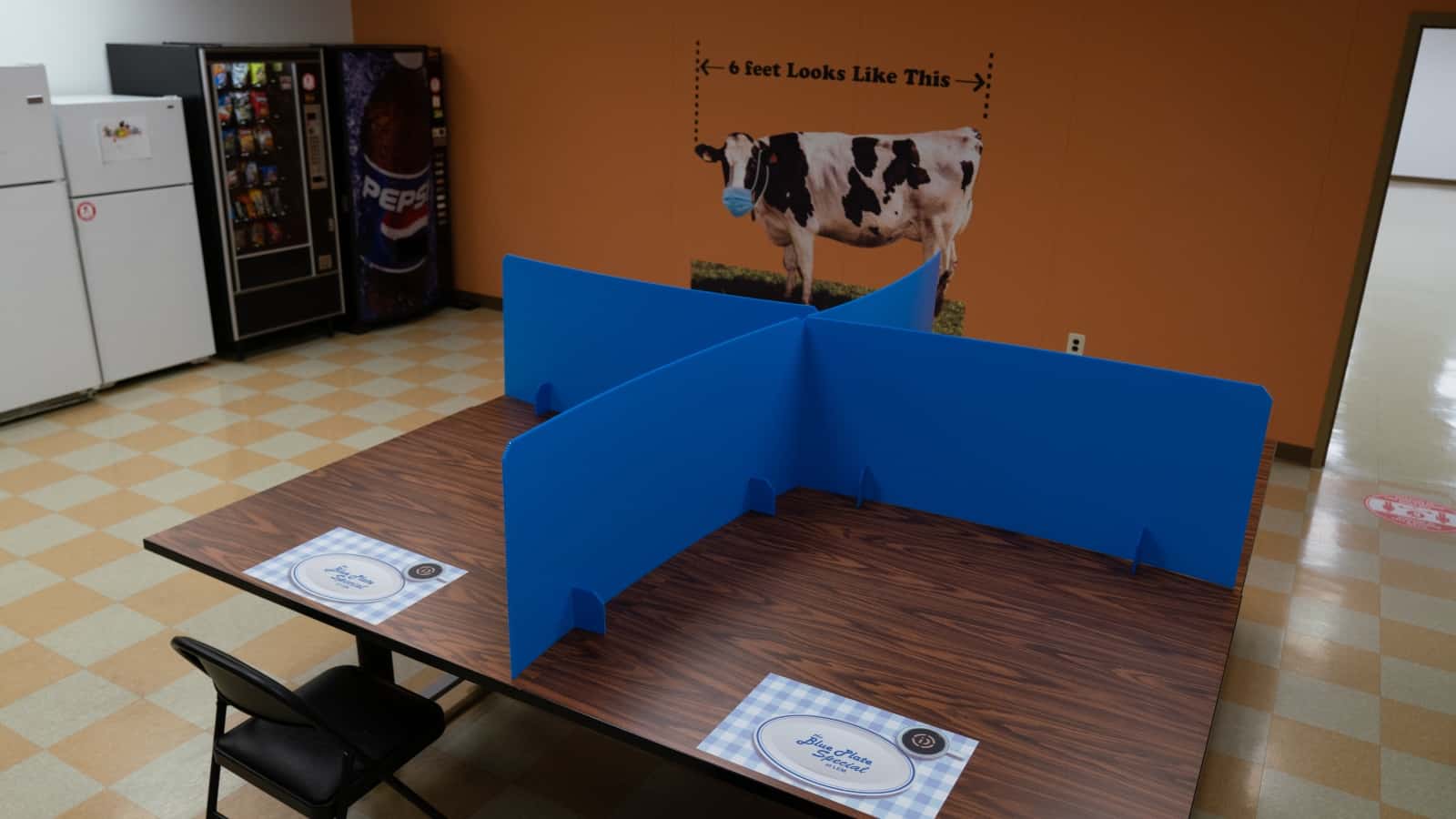
Near high-touch points such as light switches, there’s a reminder to wash your hands.
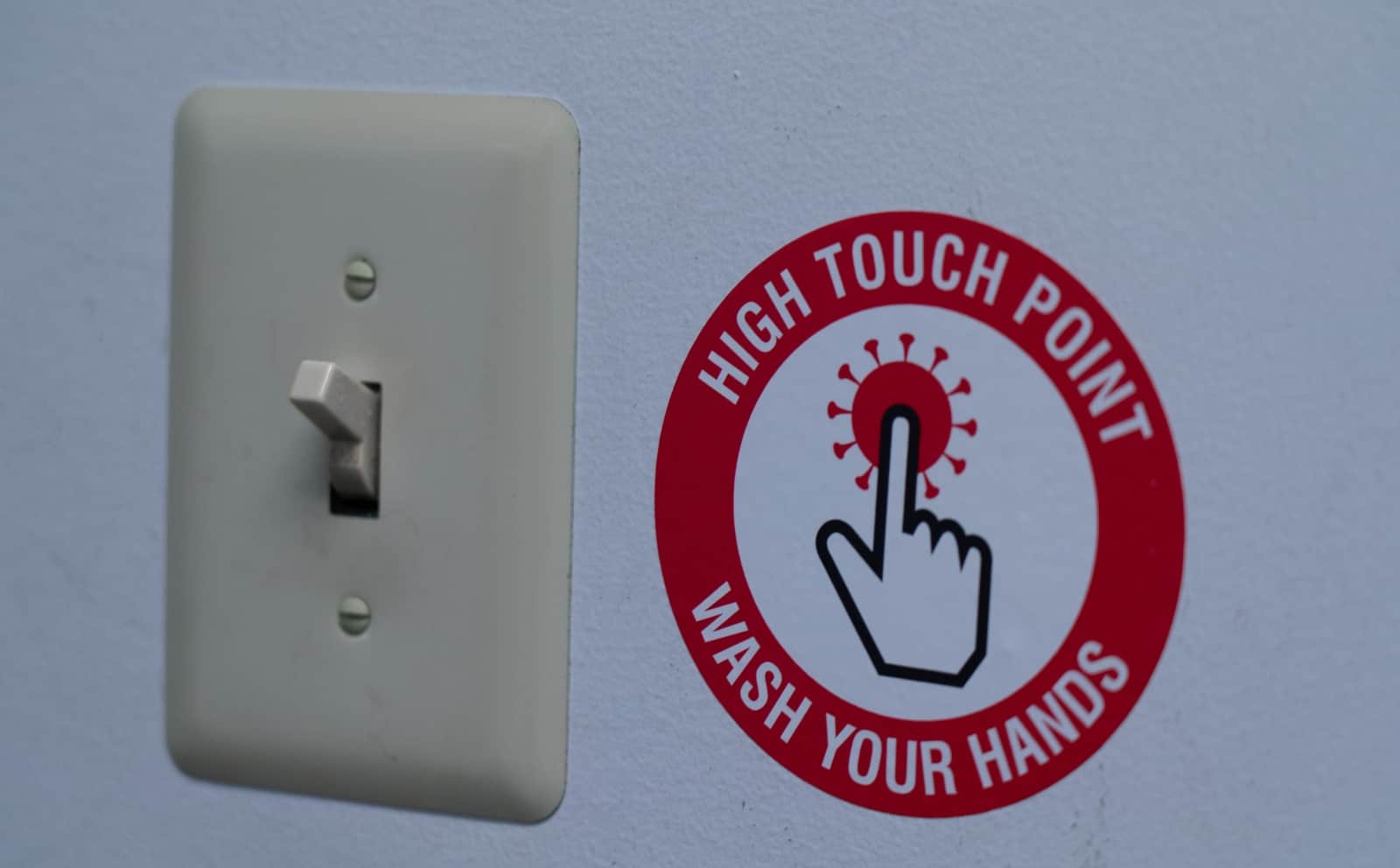
Disinfecting products, such as Clorox wipes, are available throughout the facility to sanitize surfaces, too.

With these precautions in place, LEM’s employees can safely produce custom safety identifications, labels and tags for its customers.
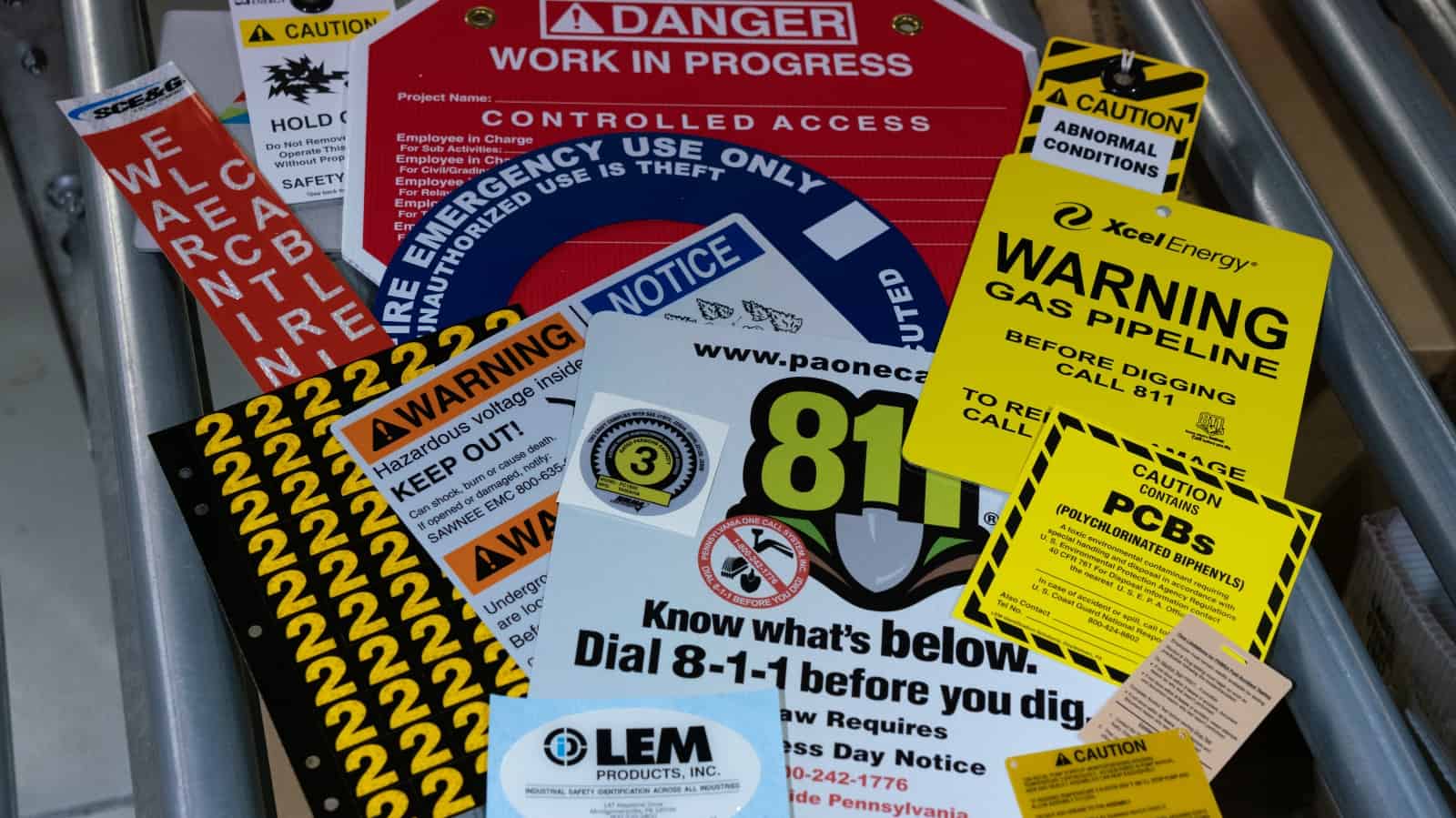
CEO Maureen O’Connor emphasized that as a leading supplier of safety related signage, LEM Products takes it as a duty to lead by example in all aspects of safety and hygiene. “Our response to COVID-19 was emblematic of how we always approach safety issues,” O’Connor said. “We urge all who read this to do everything in your power to protect your employees and your company in combating COVID-19.”
Worldwide COVID-19 Cases Reach 20 Million

Worldwide cases of COVID-19 have reached 20 million, according to the World Health Organization, with nearly 750,000 deaths. WHO Director-General Tedros Adhanom Ghebreyesus said at a press conference that there were still “green shoots of hope,” citing successful control measures in South Asia, New Zealand and more recently Europe.
Here are some other data points as we move through yet another month of the pandemic:
The U.S.: New COVID-19 cases in America totaled less than 50,000 for the second day in a row yesterday. Meanwhile, the country has 5.1 million confirmed cases overall. Some good numbers, courtesy of Johns Hopkins University:
- The seven-day average of new cases was well below the two-week average, at 54,409 compared to 57,433. That’s a sign that new cases are declining across the nation.
- The one-week average was below the two-week average in a clear majority of states (37).
- Deaths, meanwhile, are pretty similar for the one-week and two-week averages (1,051 and 1,049, respectively). Unfortunately, a handful of states are showing a rising death rate.
Children: COVID-19 cases among American kids are rising markedly, according to a new study.
- The number of cases in the last two weeks of July make up a full quarter of all children’s cases since March.
- While kids make up only 8.8% of cases nationwide now, they were only 2% back in April.
A caveat: researchers aren’t sure whether this rise is a product of increased infections or improved testing capacity. And fortunately, children make up only a small proportion of hospitalizations. But this data is at least concerning, as many of the nation’s children prepare to head back to school.
